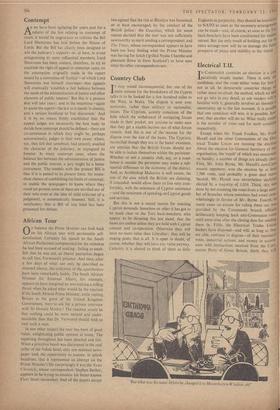Contempt
A s we have been agitating for years past for a 11, reform of the law relating to contempt of court, it would be ungracious to criticise the Bill Lord Shawcross has laid before the House of Lords. But the Bill has clearly been designed to win the judiciary's support—or, at least, to avoid antagonising its more influential members. Lord Shawcross has been content, therefore, to try to establish the right of appeal in contempt cases, on the assumption originally made in the report issued by a committee of 1 ustice'—of which Lord Shawcross was himself chairman—that appeals will eventually 'establish a fair balance between the needs of the administration of justice and other elements of public interest.' But this is a process that will take years : and in the meantime—again to quote the report—the law as it stands 'is chaotic, and a serious handicap to free discussion.' And it is by no means firmly established that the appeal judges are necessarily the best body to decide how contempt should be defined—there are circumstances in which they might be, perhaps unconsciously, judges in their own cause; where, say, they felt that somebody had unjustly assailed the character of the judiciary, or impugned its honour. In many contempt cases, where the balance lies between the administration of justice and the public interest, a jury might be a better instrument. The trouble with the present Bill is that if it is passed in its present form, the imme- diate chance of establishing the limits of contempt, to enable the newspapers to know where they stand (at present some of them are terrified out of their wits even at the idea of mild criticism of a judgment), is automatically lessened. Still, it is satisfactory that a Bill of any kind has been presented for debate.






































 Previous page
Previous page